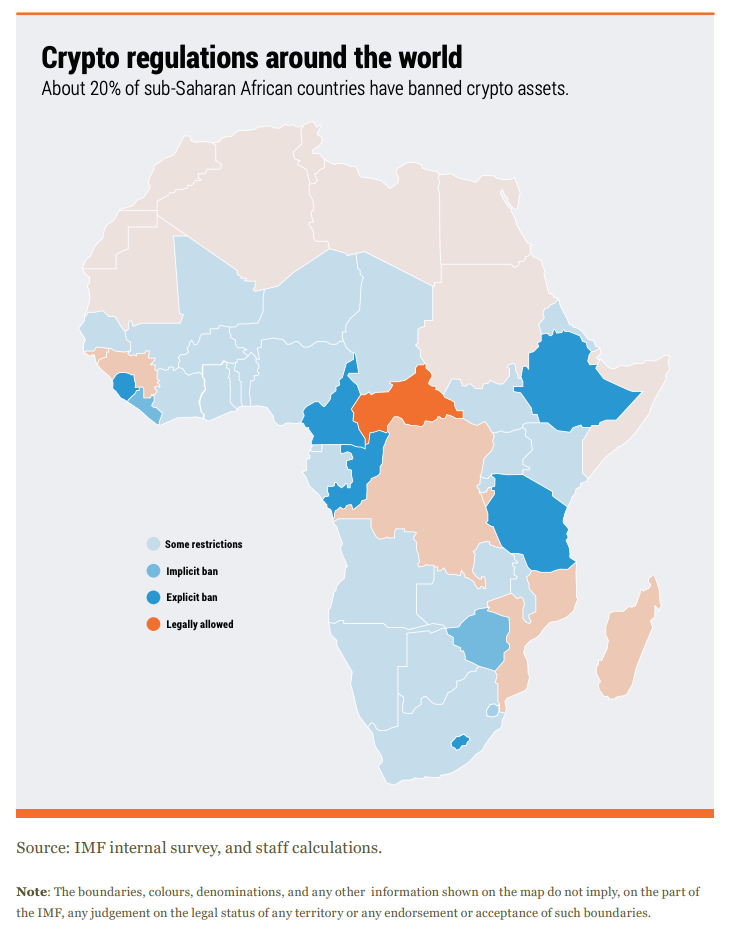Africa’s cryptocurrency market is surging on the back of booming usage of blockchain-based payments across the region.
Use cases including remittances, supply chain financing, digital identity verification, and peer-to-peer (P2P) lending, a new report produced by Finextra in association with Kora, a pan-African payment infrastructure company from Canada, says.
The Future of Fintech in Africa 2023 report, released in August, compiles expert insights from a range of firms including Binance, Jumo, TymeBank and Yoco, to provide predictions for the future of fintech in the region.
In particular, the report discusses the surge of Africa’s crypto market despite it being among the smallest markets globally. Between July 2021 and June 2022, Africa recorded US$100.6 billion in on-chain crypto volume, representing just 2% of global activity but 16% growth over the year prior, the report notes.
It highlights the high usage of crypto in Kenya, South Africa and Nigeria. These three nations have the highest number of users in the region, recording high proportion of cryptocurrency ownership across their populations at 8.5% for Kenya, 7.1% for South Africa and 6.3% for Nigeria, it says.
The report also notes Africa’s adoption of blockchain for various financial services, including cross-border transactions, supply chain finance and P2P lending. Blockchain-based platforms are also being used to streamline the regulatory compliance process and enhance the security of financial transactions, it says.
It points out that a combination of lack of legacy financial systems and very large populations which are for the most part unbanked, has significantly contributed to the growth of cryptocurrencies across the African continent.
According to Rajesh Savji Parmar, co-founder and CEO of Cloud Africa and founder of Indelible, African crypto and blockchain-based fintech companies are attractive to local and international investors due to the significant market potential and the high demand for alternative financial solutions across the continent. Additionally, these companies often operate in an environment with limited competition, providing them with a unique advantage.
African blockchain companies raised US$474 million in 2022, a 429% year-on-year (YoY) increase and the highest funding growth rate of any region, data from the African Blockchain Report 2022 by CV VC, a Swiss early-stage venture capital (VC) investor focusing on the blockchain industry, show.

Image: African blockchain venture funding, Source: African Blockchain Report 2022, CV VC, April 2023
The report warns, however, that the benefits of cryptocurrencies, which include opportunities for improved financial inclusion and financial gain, are overshadowed by the costs and risks they introduce, particularly in developing countries, as well as the challenges posed by the lack of comprehensive regulation.
It notes that while about 20% of Sub-Saharan African countries have straight out banned crypto assets, this approach has failed to slow the uptake of crypto services in Africa due to the high demand for alternative financial solutions and the potential benefits offered by these technologies.

Image: Crypto regulations in Sub-Saharan Africa, Source: The Future of Fintech in Africa 2023, Finextra and Kora, August 2023
Adoption of cloud computing picks up
Another technology highlighted in the report is cloud computing. Cloud adoption has particularly accelerated since the COVID-19 pandemic and has been fueled by a drive among organizations for digital transformation and innovation, the report says.
It notes that small to medium businesses specifically are faring better in transitioning to the cloud than larger organizations with legacy infrastructure.
Cloud services allow organizations to outsource IT services, focus on their core business and leverage innovative business models such as software-as-a-service, infrastructure-as-a-service and platform-as-a-service, the report says. But despite these benefits and opportunities, legacy infrastructure, funding, and employee limitations are hindering the migration to the cloud.
Moving forward, demand for cloud-based solutions is expected to evolve rapidly, driven by the expansion of mobile connectivity and rising usage of digital services including e-commerce, mobile banking and online schooling, the report says. Increased adoption of cloud computing will present opportunities for innovation, efficiency and economic growth, it notes.
According to the GSM Association, by the end of 2021, 515 million people subscribed to mobile services in Sub-Saharan Africa, representing 46% of the population and implying an increase of almost 20 million on 2020. By 2025, nearly 100 million new subscribers will be added in the region, the organization predicts.
Experts call for investment in African Internet infrastructure, nuanced regulations, and embracing cloud technology to improve operational efficiency, data security, compliance, and foster better customer engagement, financial inclusion, and innovation.
Fintech has grown to become the most vibrant startup sector in Africa. In 2021, the fintech sector accounted for 27% of the number of deals closed, and 61% of the region’s total funding, according to a 2022 Mastercard report.
A 2022 McKinsey report estimates that fintech revenues in Africa reached US$4-6 billion in 2020, with average penetration levels ranging between 3% and 5% (excluding South Africa). African fintech revenues are projected to reach eight times their current value by 2025, soaring to an estimated US$30 billion.

Image: Growth rate of financial services market revenue by product in Africa, US$ billion, Source: McKinsey; World Bank Group
Featured image credit: freepik







No Comments so far
Jump into a conversationNo Comments Yet!
You can be the one to start a conversation.